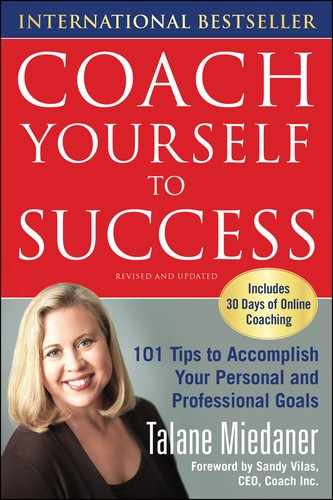TIP 35
ASK YOURSELF, “WHAT IS IMPORTANT ABOUT TODAY?”
The present is the point of power.
It is easy to become so preoccupied that you forget what really matters most. When a reporter asked Peter Lynch, the super-successful fund manager, why he left his high-powered job at Fidelity, he said, “When I am on my deathbed, I’m not going to be saying, I wish I had spent more time at the office.” He wanted to pack lunch for his two daughters and be there while they were growing up.
Before you get caught up in your work every morning, ask yourself these three questions and take a few minutes to jot down the answers:
1. What is important about today?
2. What must get done today?
3. What is important about the future?
By asking yourself, “What is important about today?” you may discover that today’s important event is your son’s third birthday and that you want to leave work at 3:00 p.m. to go to his party. Or there may be an important sales call that you need to spend an hour preparing for. Answering this question makes planning your day easier and helps you focus on the important things without getting distracted by everything else. Next, ask yourself, “What must get done today?” You must meet with your manager at 1:00 p.m. to discuss a project. You must call this customer. You’ll start to see that most of the time relatively few things must get done today. This can be very liberating. If you have a lot of “musts,” then you haven’t been in the practice of asking the third question, “What is important about the future?” This question forces you to plan. What is coming up that you could prepare for today, once you are done with today’s “musts”? The report due next week? Your grandparents’ fiftieth wedding anniversary coming up in two weeks? Keep asking these three questions, and you’ll soon catch up with the “musts.”
Whole books have been written on the concept of time management. If you focus on these three questions, your life will not only become easier, but you’ll save yourself the time of reading all those books. Time management is an oxymoron. You can’t manage time; you can only manage your activities. As for the items that aren’t on this list of three questions, they are generally a waste of time, so let’s just skip them.
I highly recommend to all my corporate and business clients that they set up a “Reading” hanging file folder in their desk drawer and regularly toss in long memos, reports, and articles to read later. Do the same for e-mails and put them in a “Reading” folder. One of my clients tried this and discovered that he never had to read 90 percent of the stuff that crossed his desk. He would file a lengthy memo, and before he’d even had a chance to read it, he would receive a new memo replacing the old one with some updated policy. On rare occasions, someone would actually refer to a memo, and he would simply say, “Yes, I’m sure I’ve seen that, hold on a second.” He’d flip through his file, pull it out, and be right up-to-date. After about a month, he would quickly sort through the pile, skim anything that looked interesting, and toss or delete the rest.
